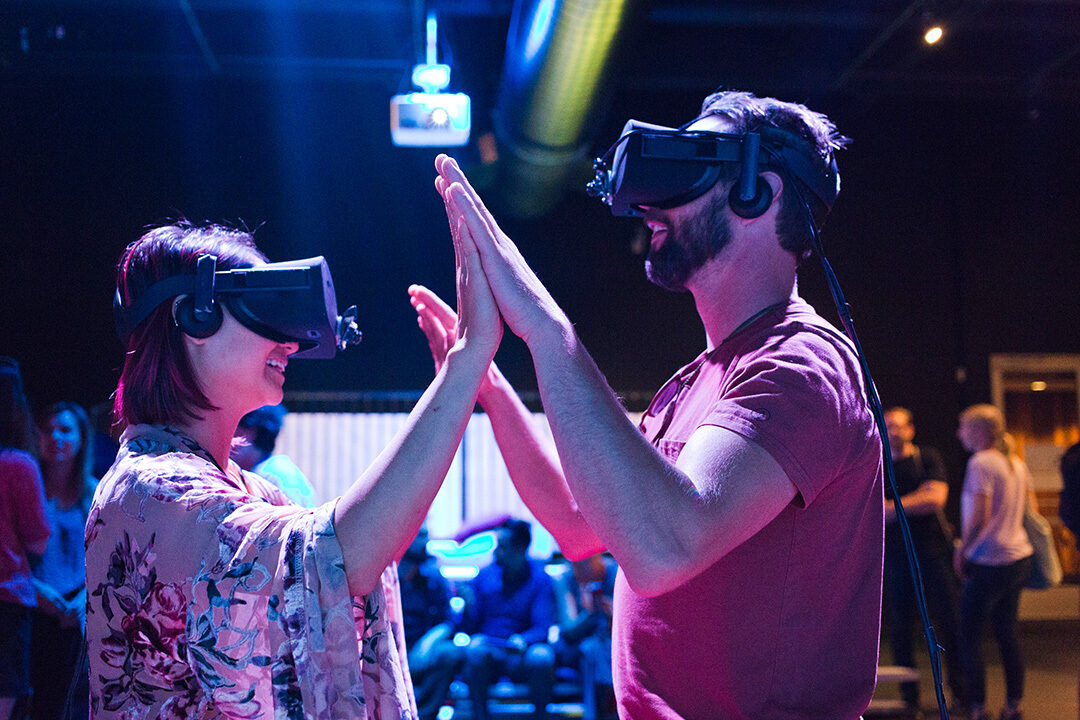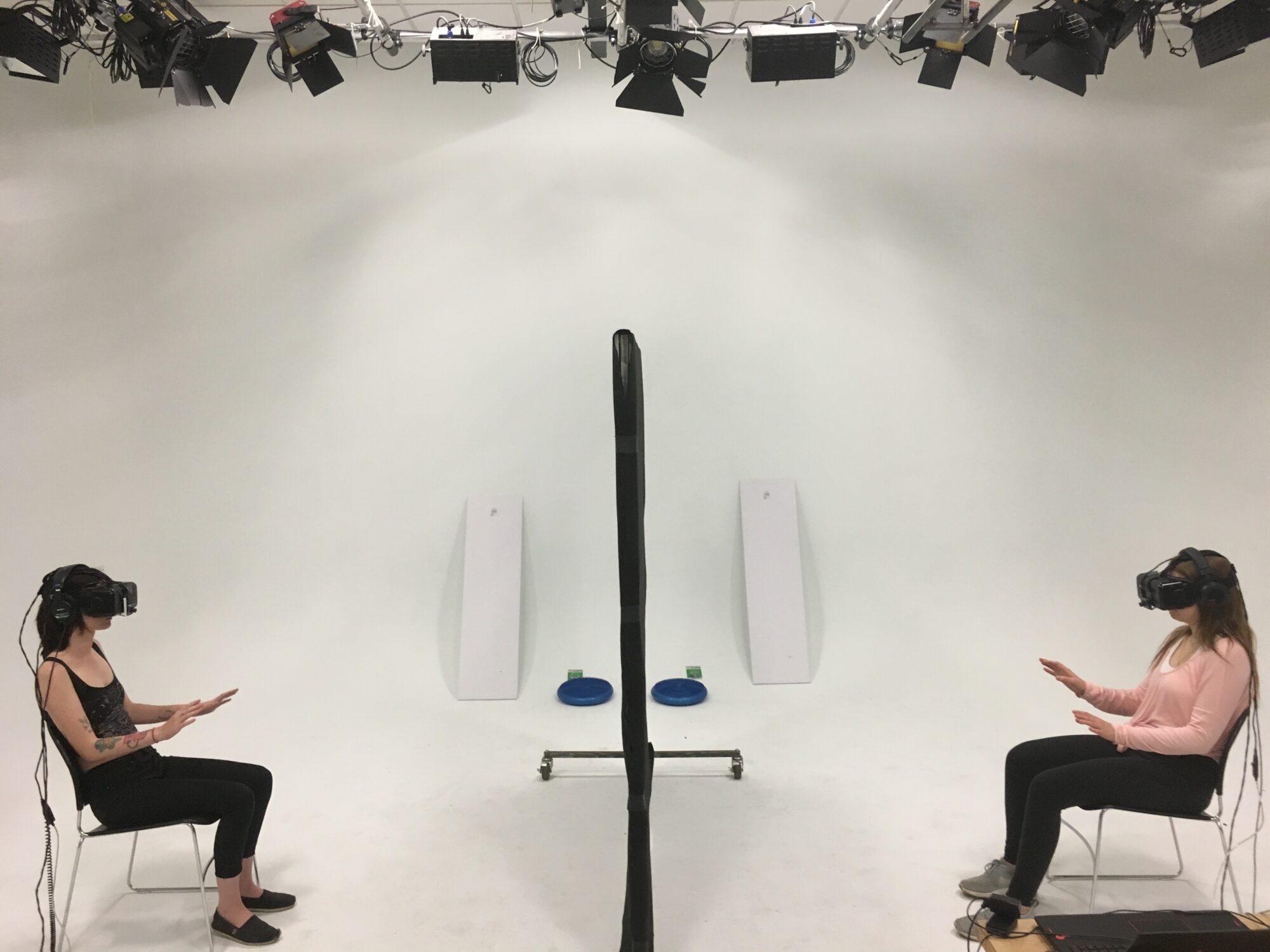The Machine to Be Another allows two participants to swap bodies by wearing VR headsets. Through this interaction, which involves multiplesenses, a nonverbal dialogue emerges: when one participant lifts their arm, the other feels like they have moved their own.

© BeAnotherLab
The sense of being as bound to the physical self is a core feature of human experience, even if we might not always be consciously aware of it. Nevertheless, the relation between “the mind” and “the body” has always been a perplexing question for humanity. Alterations in the sense of a bodily self, such as out-of-body experiences, reduplications of the self, or phantom limbs have intrigued artists, philosophers, scientists and laymen alike. There is this sense that they might reveal the underlying mechanisms of selfhood.
Laboratory experiments have allowed us to study these phenomena through a scientific lens, exposing the remarkable plasticity of our sense of body. Through concurrent stimulation of various senses, it is possible for people to feel that a foreign limb is their own, or to feel located outside their own body boundaries. Digital technologies extensively widen the possibilities of perceptual bodily transformations. From embodying an avatar in video games, to how we narrate ourselves on social media, or manipulate our faces through photo filters, new questions regarding the self and its plasticity are emerging.
Research suggests that embodying virtual avatars not only alters how we perceive our own and other persons’ bodies but has an impact on our cognition and behavior at large. The proteus effect, for example, proposes that when embodying a virtual avatar, we acquire behaviors associated with that avatar. One study showed that after embodying Albert Einstein in virtual reality, participants perform better in cognitive tasks. It has further been suggested that embodying others might increase our positive attitudes (or decrease our negative attitudes) towards them or the group that they belong to.
The video shows how the experiment works. (© BeAnotherLab)
But what about the possibility of embodying real humans?
BeAnotherLab has explored this possibility through art, addressing exchanges between real people instead of virtual avatars. Combining diverse disciplines, the collective developed The Machine to Be Another, a tool for dialogue and exchange that has been used extensively in diverse contexts.



© BeAnotherLab
Here, in collaboration with Bigna Lenggenhager from the University of Zurich, we show the Body Swap: an installation allowing two people to exchange bodies and perspectives. While giving visitors the opportunity to experience this unique self/other exchange, we are able to gather some data that can hopefully advance our scientific understanding on the perception of self and others and related cognition.
Bigna Lenggenhager, Tej Tadi, Thomas Metzinger, Olaf Blanke, «Video Ergo Sum: Manipulating Bodily Self-Consciousness», in: Science, Bd. 317, Nr. 5841 (24.8.2007), S. 1096–1099.
Chris Dijkerman, Bigna Lenggenhager, «The Body and Cognition: The Relation Between Body Representations and Higher-level Cognitive and Social Processes», in: Cortex, Nr. 104 (Juli 2018), S. 133–139.
Philippe Bertrand, Jérôme Guegan, Léonore Robieux, Cade Andrew McCall, Franck Zenasni, «Learning Empathy Through Virtual Reality: Multiple Strategies for Training Empathy-Related Abilities Using Body Ownership Illusions in Embodied Virtual Reality», in: Frontiers in Robotics and AI, Nr. 5 (22.3.2018).
Marte Roel Lesur, Helena Aicher, Sylvain Delplanque, Bigna Lenggenhager, «Being Short, Sweet, and Sour: Congruent Visuo-Olfactory Stimulation Enhances Illusory Embodiment», in: Perception, Bd. 49, Nr. 6 (18.6.2020), S. 693–696.
Marte Roel Lesur, Sonia Lyn, Bigna Lenggenhager, «How Does Embodying a Transgender Narrative Influence Social Bias? An Explorative Study in an Artistic Context», in: Frontiers in Psychology, Bd. 11 (4.8.2020).
Lara Maister, Mel Slater, Maria V. Sanchez-Vives, Manos Tsakiris, «Changing Bodies Changes Minds: Owning Another Body Affects Social Cognition», in: Trends in Cognitive Sciences, Bd. 19, Nr. 1 (15.12.2014), S. 6–12.
BeAnotherLab, interdisciplinary collective
Prof. Dr. Bigna Lenggenhager, Department of Psychology, UZH
Dr. Philippe Bertrand, interdisciplinary artist & scientist; BeAnotherLab
Prof. Dr. Guillaume Dumas, Faculty of Medicine, Université de Montréal
Dr. Marte Roel Lesur, Department of Psychology, UZH; BeAnotherLab